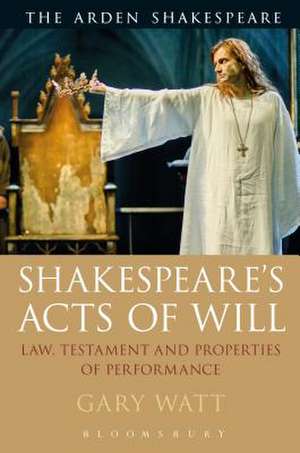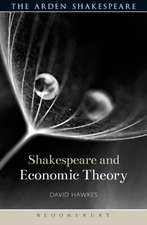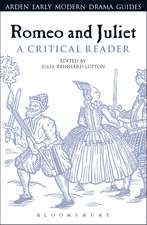Shakespeare's Acts of Will: Law, Testament and Properties of Performance
Autor Professor Gary Watten Limba Engleză Paperback – 24 ian 2018
| Toate formatele și edițiile | Preț | Express |
|---|---|---|
| Paperback (1) | 236.37 lei 6-8 săpt. | |
| Bloomsbury Publishing – 24 ian 2018 | 236.37 lei 6-8 săpt. | |
| Hardback (1) | 596.72 lei 6-8 săpt. | |
| Bloomsbury Publishing – 27 iul 2016 | 596.72 lei 6-8 săpt. |
Preț: 236.37 lei
Preț vechi: 272.08 lei
-13% Nou
Puncte Express: 355
Preț estimativ în valută:
45.23€ • 47.22$ • 37.43£
45.23€ • 47.22$ • 37.43£
Carte tipărită la comandă
Livrare economică 05-19 aprilie
Preluare comenzi: 021 569.72.76
Specificații
ISBN-13: 9781350059573
ISBN-10: 1350059579
Pagini: 304
Dimensiuni: 129 x 198 x 21 mm
Greutate: 0.3 kg
Ediția:NIPPOD
Editura: Bloomsbury Publishing
Colecția The Arden Shakespeare
Locul publicării:London, United Kingdom
ISBN-10: 1350059579
Pagini: 304
Dimensiuni: 129 x 198 x 21 mm
Greutate: 0.3 kg
Ediția:NIPPOD
Editura: Bloomsbury Publishing
Colecția The Arden Shakespeare
Locul publicării:London, United Kingdom
Caracteristici
A
major
contribution
to
the
growing
field
of
law
and
the
humanities,
particularly
law
and
literature
and
Shakespeare
and
law
Notă biografică
Gary
Wattis
Professor
of
Law
at
the
University
of
Warwick,
UK.
One
of
the
founding
editors
of
the
journalLaw
and
Humanities,
he
is
a
National
Teaching
Fellow
and
regularly
delivers
workshops
on
rhetoric
for
the
Royal
Shakespeare
Company.
In
addition
to
texts
on
the
law
of
trusts,
he
has
written
monographs
on
law
and
literature,
law
and
dress,
and
has
co-edited
the
collectionShakespeare
and
the
Law.
Cuprins
Acknowledgements1.
'Performance
is
a
kind
of
will
or
testament'2.
Handling
Tradition:
Testament
as
Trade
inRichard
IIandKing
John3.
Worlds
of
Will
inAs
You
Like
ItandThe
Merchant
of
Venice4.
'Shall
I
descend?':
Rhetorical
Stasis
and
Moving
Will
inJulius
Caesar5.
'His
will
is
not
his
own':HamletDowncast
and
the
Problem
of
Performance6.
Dust
to
Dust
and
Sealing
Wax:
The
Materials
of
Testamentary
PerformanceNotesIndex
Recenzii
Through
a
strong
analysis
of
six
plays-Richard
II,
King
John,
As
You
Like
It,
The
Merchant
of
Venice,
Julius
Caesar,andHamlet-Watt
extends
the
definition
of
legal
terms
("will,"
"testament,"
"executor,"
"probate,"
"witness")
to
highlight
the
rhetorical
and
performative
crossover
between
law
and
theater,
or
the
ways
in
which
words
"express"
and
"move"
will
.
Watt,
a
professor
of
law
at
the
University
of
Warwick,
presents
a
careful
and
caring
study
of
will
in
Shakespeare's
plays.
Watt's
thorough
rendering
of
rhetoric
and
performance
is
provocative
and
fully
worth
study.
A fiercely intelligent but nimbly written book that maintains a spirit of intellectual generosity throughout.
Shakespeare's plays take shape in a space between the medieval and modern worlds, a space in which a divinely sanctioned hierarchy was fast losing ground to an order defined by individual will and contract. Watt (Univ. of Warwick, UK) focuses specifically on the legal aspects of this transformation, providing scholarly studies ofRichard II, King John, As You Like It, The Merchant of Venice, Julius Caesar,andHamlet. Comparing the theater to a courtroom in which the audience is called on to render a verdict, Watt explores the various ways in which "performance is a kind of will or testament" (a quote fromTimon of Athensthat serves as the title of chapter 1). Watt explores both the specific use of legal language-especially in plays such asAs You Like ItandThe Merchant of Venice-and the broader way in which will (or the failure of will) drives the plot and characters in plays such asRichard IIandHamlet. Throughout, Watt usefully engages current literary scholarship. Although Watt's prose is accessible, the rather narrow perspective of the book limits its audience to scholars. Summing Up: Recommended.
Probing the analogy between the conditions of performance and the structure of testamentary action, Gary Watt's book offers an original, minutely researched, and provocative thesis. Tracing 'testament' to its Latin etymology - suggesting the presence of a witness to the mind - Watt offers a new way of understanding the exchange between performers and audience that defines the theatrical event. What is more, he suggests that exchange leads to change - transformations of abiding social significance.
A fiercely intelligent but nimbly written book that maintains a spirit of intellectual generosity throughout.
Shakespeare's plays take shape in a space between the medieval and modern worlds, a space in which a divinely sanctioned hierarchy was fast losing ground to an order defined by individual will and contract. Watt (Univ. of Warwick, UK) focuses specifically on the legal aspects of this transformation, providing scholarly studies ofRichard II, King John, As You Like It, The Merchant of Venice, Julius Caesar,andHamlet. Comparing the theater to a courtroom in which the audience is called on to render a verdict, Watt explores the various ways in which "performance is a kind of will or testament" (a quote fromTimon of Athensthat serves as the title of chapter 1). Watt explores both the specific use of legal language-especially in plays such asAs You Like ItandThe Merchant of Venice-and the broader way in which will (or the failure of will) drives the plot and characters in plays such asRichard IIandHamlet. Throughout, Watt usefully engages current literary scholarship. Although Watt's prose is accessible, the rather narrow perspective of the book limits its audience to scholars. Summing Up: Recommended.
Probing the analogy between the conditions of performance and the structure of testamentary action, Gary Watt's book offers an original, minutely researched, and provocative thesis. Tracing 'testament' to its Latin etymology - suggesting the presence of a witness to the mind - Watt offers a new way of understanding the exchange between performers and audience that defines the theatrical event. What is more, he suggests that exchange leads to change - transformations of abiding social significance.












